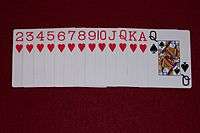Black Lady
 | |
| Origin | Reversis |
|---|---|
| Alternative names | Chase The Lady |
| Type | Trick-taking |
| Players | 3-10 |
| Skills required | Card counting |
| Cards | 1 or 2x52 |
| Deck | Anglo-American |
| Play | Clockwise |
| Card rank (highest to lowest) | A K Q J 10 9 8 7 6 5 4 3 2 |
| Playing time | 20 minutes per hand |
| Random chance | Low — Moderate |
| Related games | |
| Hearts | |
Black Lady is an extremely combative variant of the card game Whist that is popular in the United Kingdom and is similar to the North American game Hearts. It is commonly played among large groups of players, typically 8 to 10, using two decks of cards, or it can be played by as few as three players using a single deck.
Main rules
- The game proceeds by trick-taking in the standard way, and there are no trumps with four players as standard.
- Certain cards are listed as penalty cards, and have assigned penalty values. When a trick is taken which contains any penalty cards, the winner of the trick is penalised by the total number of these penalty points. Penalty points are counted at the end of the round (once the whole deck has been played). Each player keeps a tally of their accumulated points with the aim of the game to minimise the total number of points gained.
The penalty cards, according to the Smith Variant are :
- Queen of Spades: 50 points (hence 'Black Lady')
- Ace of Spades: 25 points
- Heart face cards: Ace: 14 Points, King: 13 Points, Queen: 12 Points, Jack: 11 Points
- All other Hearts: face value
There are therefore 179 points to be taken per deck, per hand. Other variants have different point allocations for cards, however these are not considered the primary versions.
- If one player takes every penalty card in the pack, called 'going for the lot', everyone else gets the full 179 points.
- The game ends when one player accumulates over 500 points. The player with the lowest amount of points then wins the game, all other players lose. (One winner, three losers)
Other rules
The cards are dealt out evenly among all the players, using standard Whist conventions for rotating dealership and lead. This requires that the number of cards in play is divisible by the number of players, so before any hands are dealt, the pack(s) is inspected and the appropriate number of innocuous cards of trivial denomination (low Diamonds/Clubs) are extracted and discarded.
When multiple packs are in use, there are multiple cards of each face. When the winning card face in a trick is played multiple times to that trick, the first such card played is the one which takes the trick. The Smith Variant uses only one deck of cards and is typical for four players.
After the deal and before the first lead, each player must select three of his dealt cards and pass them covertly to his left-hand neighbour, and then accept three cards from his right-hand neighbour. The selection of the pass-on cards is a science in itself, given issues such as suit distribution, ability to lead through a passed-on danger card, hands which may be suited to going for the lot, and so forth. There is also the problem of disguising your intentions from your left-hand neighbour, especially when going for the lot.
The play proceeds, hand by hand, until the allotted time span has expired or if an allotted points total is overcome. The winner is the player with the smallest running penalty score.
An alternative called Dirty Liz proceeds in a similar fashion to Black Lady except: There is a trump suit each hand in the order Diamonds, Clubs, Hearts, Spades. 1-10 of Hearts score 1 point each, J=2, Q=3, K=4, A=5 and the Queen of Spades is 13 points as normal. At the start of each hand, after the deal, each player passes three cards to their left.